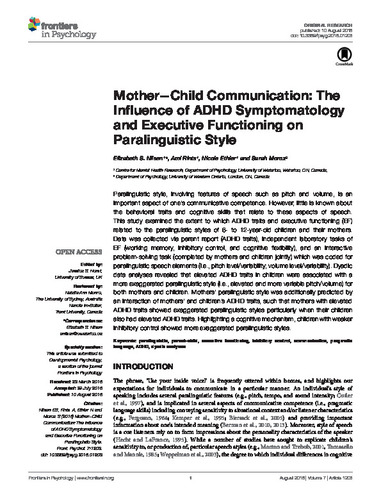| dc.contributor.author | Nilsen, Elizabeth S. | |
| dc.contributor.author | Rints, Ami | |
| dc.contributor.author | Ethier, Nicole | |
| dc.contributor.author | Moroz, Sarah | |
| dc.date.accessioned | 2021-11-05 14:53:25 (GMT) | |
| dc.date.available | 2021-11-05 14:53:25 (GMT) | |
| dc.date.issued | 2016-08-10 | |
| dc.identifier.uri | https://doi.org/10.3389/fpsyg.2016.01203 | |
| dc.identifier.uri | http://hdl.handle.net/10012/17690 | |
| dc.description.abstract | Paralinguistic style, involving features of speech such as pitch and volume, is an important aspect of one’s communicative competence. However, little is known about the behavioral traits and cognitive skills that relate to these aspects of speech. This study examined the extent to which ADHD traits and executive functioning (EF) related to the paralinguistic styles of 8- to 12-year-old children and their mothers. Data was collected via parent report (ADHD traits), independent laboratory tasks of EF (working memory, inhibitory control, and cognitive flexibility), and an interactive problem-solving task (completed by mothers and children jointly) which was coded for paralinguistic speech elements (i.e., pitch level/variability; volume level/variability). Dyadic data analyses revealed that elevated ADHD traits in children were associated with a more exaggerated paralinguistic style (i.e., elevated and more variable pitch/volume) for both mothers and children. Mothers’ paralinguistic style was additionally predicted by an interaction of mothers’ and children’s ADHD traits, such that mothers with elevated ADHD traits showed exaggerated paralinguistic styles particularly when their children also had elevated ADHD traits. Highlighting a cognitive mechanism, children with weaker inhibitory control showed more exaggerated paralinguistic styles. | en |
| dc.description.sponsorship | This research was funded by an Ontario Mental Health Foundation New Investigator Grant awarded to EN. | en |
| dc.language.iso | en | en |
| dc.publisher | Frontiers | en |
| dc.rights | Attribution-NonCommercial-NoDerivatives 4.0 International | * |
| dc.rights.uri | http://creativecommons.org/licenses/by-nc-nd/4.0/ | * |
| dc.subject | paralinguistic | en |
| dc.subject | parent–child | en |
| dc.subject | executive functioning | en |
| dc.subject | inhibitory control | en |
| dc.subject | communication | en |
| dc.subject | pragmatic language | en |
| dc.subject | ADHD | en |
| dc.subject | dyadic analyses | en |
| dc.title | Mother-Child Communication: The Influence of ADHD Symptomatology and Executive Functioning on Paralinguistic Style | en |
| dc.type | Article | en |
| dcterms.bibliographicCitation | Nilsen, E. S., Rints, A., Ethier, N., & Moroz, S. (2016). Mother-Child Communication: The Influence of ADHD Symptomatology and Executive Functioning on Paralinguistic Style. Frontiers in Psychology, 7, 1203. https://doi.org/10.3389/fpsyg.2016.01203 | en |
| uws.contributor.affiliation1 | Faculty of Arts | en |
| uws.contributor.affiliation2 | Psychology | en |
| uws.typeOfResource | Text | en |
| uws.peerReviewStatus | Reviewed | en |
| uws.scholarLevel | Faculty | en |


